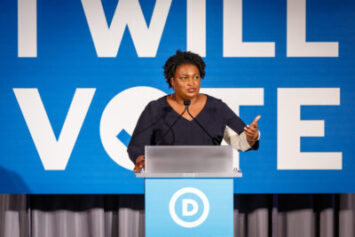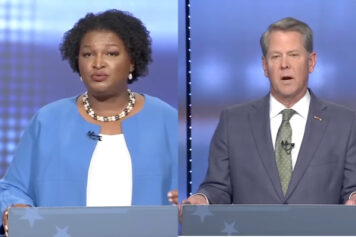
September 24 is National Voter Registration Day, a time to highlight democratic participation and the civic duty to get involved in local elections, register hundreds of thousands of people to vote and educate the public on the voting process. While many people focus merely on the presidential elections that take place every four years, in reality the local elections matter more in terms of the everyday issues facing the Black community. Elections do matter and they do have consequences, not only on the national level, but in the state, county and city races, all the way down to the proverbial dog catcher.
Within the Black community, leaders are taking voter registration with a sense of urgency. In Georgia, Stacey Abrams lost last year’s gubernatorial race against Brian Kemp, who was the secretary of state and engaged in voter suppression and voter roll purges while supervising his own election. The former state lawmaker has opted not to run for office this election cycle, instead forming Fair Fight to send teams to fight voter suppression in 20 battleground states in 2020, and launching Fair Count, a nonprofit organization committed to ensuring the census counts people of color, non-English speakers and other historically “hard-to-count populations” in Georgia.
When communities of color are undercounted, according to Abrams, resources are forfeited. “If we don’t count black men in Georgia, for example,” Abrams said, “if the predicted undercount happens, it’s $150 million a year that is lost in the state. That’s real money. That’s health care. That’s access to education.”
Abrams — who received more votes than any Democrat in the history of Georgia elections and has refused to concede after losing by a razor-thin margin — believes her 2018 race provides a playbook for Democrats to win in 2020 by seeking unlikely voters rather than swing voters in this heavily Black state. Two U.S. Senate seats are up for grabs in Georgia next year.
The Poor People’s Campaign under Rev. William Barber will tour at least 22 states this month to help disenfranchised communities register to vote. The campaign is championing a “new electorate” of low-income voters, who have a lower level of voter participation and could determine election outcomes.
Throughout the country, the importance of voting and the consequences of staying at home are clear. On the state level, for example, the party that controls the legislature typically draws the electoral map, and with it, determines how districts are shaped and how resources are distributed to the public. State legislatures draw congressional districts in 31 states, and state legislative districts in 30 states. In some cases, state legislatures engage in racial and partisan gerrymandering —- shaping, distorting and manipulating districts to drown out and disempower Black voters, all for the purpose of maintaining conservative majorities. While both parties have a history of gerrymandering, Republicans are now benefiting the most from the practice and have turned it into a science.
A most extreme example of racial gerrymandering took place in North Carolina, where a state court ordered the Republican state legislature to redraw the state legislative districts due to “extreme partisan gerrymandering.” While North Carolina Republicans received fewer than half of the votes in the 2018 elections, the GOP controls 29 of 50 seats in the state Senate, and 65 of 120 seats in the state House.
Recently, while state Democrats attended a 9/11 memorial service, North Carolina Republicans held a vote to kill an expansion of Medicaid to thousands of low-income people. GOP lawmakers held the vote to override the veto of Democratic Gov. Roy Cooper after lying about whether a vote would take place that day.
In Florida, the impact of voting was more than evident in the gubernatorial election, where Black Democrat Andrew Gillum lost to Republican Ron DeSantis by 30,000 votes, in a race in which 8 million votes were cast. The election had a direct impact on the voting rights in the Sunshine State. Although 65 percent of Floridians voted for a measure to restore voting rights to 1.5 million ex-felons not convicted of murder or a sex crime, the Republican state legislature passed a law requiring the formerly incarcerated to pay the equivalent of a poll tax before allowing them to vote, thereby undercutting their voting rights.
Voting also determines the actors in the criminal justice system and law enforcement, such as district attorneys, judges and sheriffs. The racial inequities in the law were highlighted recently when actress Felicity Huffman, who is white, was sentenced to 14 days in jail, a $30,000 fine, one year of supervised release and 250 hours of community service for her role in a college admissions scandal, in which Huffman paid $15,000 to have someone change the answers on her daughter’s SAT test. In contrast, Tanya McDowell, a 29-year old homeless Black mother, was sentenced to five years in prison for using a friend’s address to enroll her son in another school district. Although Huffman’s case took place in a federal court with a federal judge and prosecutor while McDowell was tried in a state court, voices in the Black community have made note of the glaring disparities in punishment that Black parents face for seeking better educational opportunities for their children.
Ninety-five percent of elected state and local prosecutors are white, and 79 percent are white men. State courts, which handle 95 percent of cases in the U.S., are run by white men. According to a study from the American Constitution Society, state court judges do not reflect the populations they serve, impacting public confidence in the justice system. For example, white men are 30 percent of the population but 58 percent of state judges. Black, Latino, Asian and other people of color are 40 percent of the population but merely 20 percent of state judges. Similarly, a study from the Brennan Center found that 24 states have an all-white supreme court, the highest court in a given state, while 13 states have never had a justice of color, and 18 have never seated a Black justice. Women only hold 36 percent of state high court seats. “Our judicial system loses credibility with the public when the judges making the rulings don’t reflect the diversity of the people affected by those rulings. Our courts can’t function without the public’s trust,” said Alicia Bannon, Managing Director of the Brennan Center’s Democracy Program and a coauthor of the report.
The importance of voting and its impact on criminal justice was evident in Pennsylvania, where the state board of pardons recently approved 23 clemency applications of people serving a life sentence without parole — a state record. Lt. Gov. John Fetterman, who chairs the board, appointed Brandon Flood, a formerly incarcerated Black man who was pardoned by Gov. Wolf earlier this year, as board secretary.
Ignoring down-ballot candidates and measures has a tangible impact on our everyday lives and the interests of Black people. Aside from the many state and local candidates for elected office, there are ballot initiatives that determine how taxpayer money is allocated. Ballot measures address the underfunding of public schools and either seek more money and new funding sources for students and dismally low teacher pay, or mandate austerity measures and budget cuts for an already crippled education system. Ballot initiatives to protect people with pre-existing conditions and increase the minimum wage can have an immediate effect on one’s health and wealth, and measures to legalize marijuana stand to provide new revenue sources and a departure from drug criminalization that has disproportionately targeted Black people.
Far beyond the presidential elections, voting on the local level provides a mechanism to address the disparities and discrimination the Black community faces on a daily basis.


